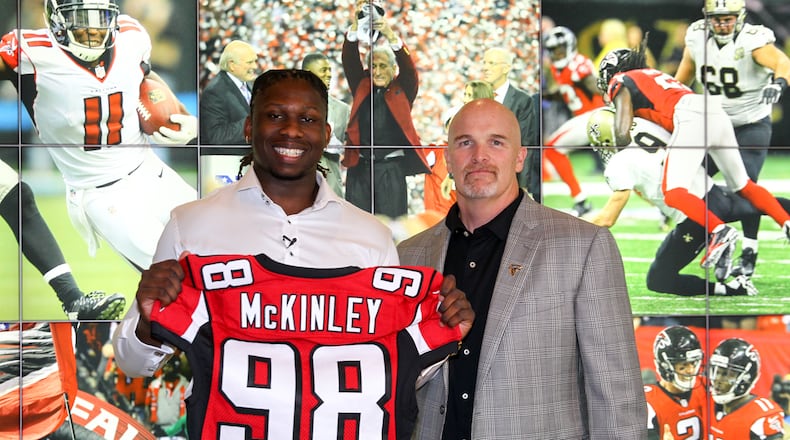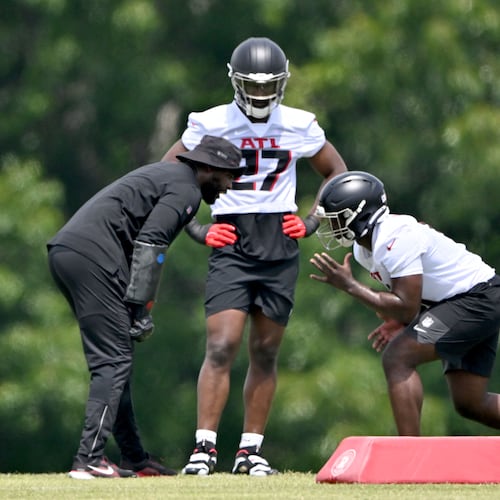Takkarist McKinley seems quite sure of the person soon to be wrapped in a Falcons jersey.
Yes, inside that jersey beats a racing heart and a combustible disposition. Good qualities for a pass-rusher, if not for a master of ceremonies. If that means during the most significant moment of a turbulent life, he lets loose with a couple of R-rated expletives on live television, then he’ll gladly take the flak.
In the cool reflection of a day later, this is what he had to say about that Friday: “If I had to go back and do it again, I’d probably say the “F” word again. I’m going to be me. Either you’re going to like it or you’re not.”
There McKinley was on the big stage in Philadelphia on Thursday, just announced as the Falcons’ No. 1 draft pick, and he was carrying on like a dockworker at quitting time. Let one oath drop while whooping it up with the commissioner. Dropped the F-bomb during a walk-off interview with the NFL Network’s Deion Sanders.
Ear muffs, kids.
You know you have crossed some boundary of propriety when Sanders — who himself was once upon a time a Falcons top draft pick clad in a Prime Time nickname and a metric ton of jewelry — is telling you to tone it down.
“He was telling me keep that fire, keep that hunger, don’t change, be you, but just learn how to control it,” McKinley said of Sanders’ sage advice. “Being you is what got you here today. Just control that sometimes.”
It just poured out, don’t you know. It was raw. It was as real as the emotion that prompted McKinley to carry that large photo portrait of his late grandmother onto the draft stage with him. And spill the story of the 2011 deathbed promise he made to Myrtle Collins that he would make something of himself through football. Nothing about that story is wallet-sized.
It was, simply, the best scene of the draft’s first night.
And you know that Falcons coach Dan Quinn, given his penchant for the pithy saying, the inspirational bromide, can borrow freely from McKinley’s Philadelphia performance.
You can almost see this quote from Thursday night up on the team meeting room: “Fine me later.”
Or this from another fired-up ramble: “C’mon, man! Get to the damn quarterback! We gonna get to the quarterback!”
“I will wait until that opportunity presents itself. That (“Fine me later”) clip may show itself in a team meeting at some point,” Quinn said.
After all, it was all said in the spirit of being true to the person inside that jersey. Nothing that happened or was said ran counter to the way the top pick out of UCLA has chosen to play his game.
“That kid, man, he plays all-out, 100 percent,” said Alonzo Carter, both McKinley’s coach during a brief junior college stopover and a family friend.
When Quinn saw video evidence of the pass-rushing defensive end hitting the Colorado quarterback, scrambling to his feet and throwing an important block on the ensuing interception, his interest was piqued. When he noted him running down a wide receiver on a reverse against Texas A&M, the coach said, “That’s the speed I’m looking for.”
And then there’s the shoulder. There are those who may worry about the new guy’s fitness, coming off the kind of shoulder surgery serious enough to require the installing hardware to hold the thing together.
Others may argue the long-standing injury is a badge of honor.
“Anybody who can play with a torn labrum and a chipped bone for a year and a half and then go to the combine and still hit 24 reps (benching 225 pounds) and run 4.5 — that’s stout,” Carter said. “He never missed a game because of it. He never missed a beat, you never knew this kid was hurt. This kid played with a season-ending injury for a year and a half. Who does that?”
It almost never happened. Two years after McKinley whispered his promise to his dying grandmother, the words teetered on irrelevance. Having signed with Cal, he was found academically ineligible. For a young man whose mother had abandoned him and whose father is a mystery, it could have been one rejection too many.
“I was over it (football),” he said.
“I felt like I was talking to an ostrich, the boy wouldn’t pick his head up,” remembered Carter, then the coach at Contra Costa College. He was tasked with getting McKinley back on track, and found errors in his high school transcript that allowed McKinley to get to UCLA just a year later. “I had to literally get down and make him give me eye contact and tell him everything was going to be OK. He thought it was over.”
Applying to McDonald’s and Taco Bell, McKinley might have taken up the spatula had either fast food joint called him back. But neither did. And out of legal options, he went back to football. Even made himself into a reliable student along the way.
What’s inside the jersey is substantial, the stuff that made McKinley a versatile pass-rusher with 10 sacks for the Bruins last season. A Vic Beasley compliment, in the Falcons’ eyes.
It’s on the other side of the jersey, where the name is stitched across the shoulders, that McKinley’s story turns so foggy.
Who is McKinley? It is his family name, yet it belongs to no one he can call family.
His mother abandoned him when he was 5, reappearing 12 years later only to bug out again. A reunion turned into a cruel tease. McKinley’s cousin told the L.A. Daily News, “He was throwing her clothes out of the house, shouting, ‘I don’t ever want to see her again!’” He has no contact with his mother now. Her name is not McKinley.
His grandmother raised him in Oakland, Calif., sometimes depending upon recycling cans and bottles to make the rent. “I know she would have been so happy and proud. That was her baby,” said Peggy Wiggins, McKinley’s aunt. After his grandmother’s death, the responsibility of raising McKinley and shielding him from the temptations of the street fell to his aunt and older cousin. None is named McKinley.
When he was barely 4, back in Mississippi, he does remember meeting a man who might have been his father. His name was McKinley. But a paternity test later showed he wasn’t the one.
So, who is McKinley?
“I have no idea,” the newest Falcons said.
“I’m the only McKinley. I don’t know who my father is.”
So, McKinley must make his own certainty, realizing that it’s what’s inside the jersey that matters most. He’ll rely upon the people who have stepped up for a virtual orphan. And he’ll rely on himself.
While impressing some along the way. Before UCLA played Cal this season, the coach from the school that initially signed McKinley, and then had to let him go, was moved to the highest kind of praise.
“I’m 47 years old, and it’s an inspiration for me,” Cal’s Sonny Dykes said.
And if he engages in an inappropriate word or two on the biggest day of his life, McKinley will keep all explanations to a minimum: “That doesn’t mean I’m a thug or a bad person or stuff like that.”
“This kid’s a dreamer,” Carter, his former coach and family friend said. “When you live your life in disappointment, you’re living in the moment. That kid deserved that moment.”
About the Author
Keep Reading
The Latest
Featured




